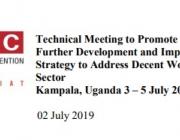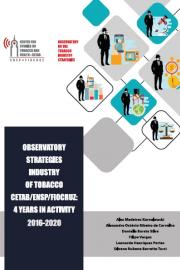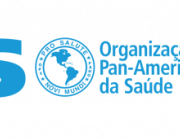In September 2015, representatives of the 193 UN member states acknowledged that eradicating poverty in all off its forms and dimensions, especially extreme poverty, is the greatest global challenge and an indispensable requirement for sustainable development. By adopting the document “Transforming our World: The 2030 Agenda for Sustainable Development” (A/70/L.1)1 , the countries resolved to take action to promote sustainable development in the next 15 years pledging “that no one will be left behind ». The 2030 Agenda is a plan of action designed to deal with areas that are critical to both humanity and the planet. It includes actions aimed to the wellbeing of people, the environment, bringing about peace and prosperity.
TURCI, Silvana Rubano Barretto. SILVA, Vera Luiza da Costa e. Interference of the tobacco industry in the 2030 Agenda. CETAB, Rio de Janeiro, 26 out 2021. Acesso em: 10 jul 2024.
100 specialists in nicotine science, policy and practice have come together to call on the 182 parties (countries) to the Framework Convention on Tobacco Control to take a more positive stance on tobacco harm reduction. The letter pushes back against WHO’s misguided and unscientific drive for prohibition or excessive regulation and taxation of vaping products, heated and smokeless tobacco products, and novel oral nicotine products, such as pouches.
ONE hundred specialists call for WHO to change its hostile stance on tobacco harm reduction - new letter to FCTC delegates published. The Counterfactual, Inglaterra, 18 out 2021. Disponível em: https://clivebates.com/one-hundred-specialists-call-for-who-to-change-st.... Acesso em: 1 jul 2024.
June 5th, 2021, is World Environment Day. According to UNEP, we are the generation that can make peace with nature. As the world struggles with the worse pandemic ever, several discussions around environmental aspects linked to the surge of pandemics have emerged. According to an IPBES report released in October 2020, future pandemics will emerge more often, spread more rapidly, do more damage to the world economy and kill more people than COVID-19 unless there is a transformative change in the global approach to dealing with infectious diseases. The same human activities that drive climate change and biodiversity loss also drive pandemic risk through their impacts on our environment. Changes in the way we use land; the expansion and intensification of agriculture; and unsustainable trade, production and consumption disrupt nature and increase contact between wildlife, livestock, pathogens and people. According to the UN Secretary General, there is a framework for action – the 2030 Agenda for Sustainable Development and the Paris Agreement on Climate Change. A number of reports have followed. A report commissioned by the WHO FCTC Secretariat in 2019, concludes that tobacco’s environmental footprint, together with its negative health, social and economic implications, make it incompatible with the global sustainable development agenda, in particular SDGs 12 – responsible consumption and production, 13 – climate action, 14 – life under water, and 15 life on land. The report also describes several ways tobacco harms the environment: global cultivation of tobacco requires substantial land use, water consumption, pesticides and labour – all finite resources that could be put to better use. Harmful impacts include deforestation leading to climate change; water and soil depletion; human toxicity; ecosystem eutrophication; and acidification. Processing, the curing of tobacco leaves to produce dry tobacco, is highly energy intensive with use of coal or wood contributing to greenhouse gas emission and deforestation. Additional inputs and waste production occur with the transport and manufacture of cigarettes as well as their final use and disposal. Cigarette buts and the ENDS/HTPs batteries and devices are additional examples that show how the environment can be devastated by a product that roughly kills one in every two consumers. A product that is totally unnecessary to human beings. A product that is produced by an industry that uses child labor to make their profits, misleads the public with new generation products as a cessation panacea that keeps their consumers addicted to nicotine while enticing young generations, buys science and lobbies policy makers, decision makers and legislators. And, at the same time promotes itself as a supporter to human rights and the environment. Finally, in a world facing enormous pressures on natural resources, tobacco competes with valuable commodities that are essential for humanity and adds significant pressures on the health of our planet and its most vulnerable inhabitants. In the name of the present and future generations, we must do something about it. The WHO Framework Convention on Tobacco Control (FCTC) addresses the environmental concerns regarding tobacco in Article 18, which states that: “In carrying out their obligations under this Convention, the Parties agree to have due regard to the protection of the environment and the health of persons in relation to the environment in respect to tobacco cultivation and manufacture within their respective territories.” According to an article published by Thomas Novotny & al, our interviewee of today, the environmental lifecycle of tobacco can be roughly divided into four stages: (i) tobacco growing and curing; (ii) product manufacturing and distribution; (iii) product consumption; and (iv) post-consumption waste. Thomas Novotny is the invitee from CETAB/FIOCRUZ and CICCGT in commemoration of World Environment Day, 5th June 2021. He is well known in the global public health community for his research in the tobacco control field. Dr Novotny has studied extensively the environmental impact of the tobacco value chain and will share with us some insights about the topic.
Background Tobacco companies have maintained a profitable business in Singapore, despite its strong anti-tobacco climate and commitment to protect public health policymaking from tobacco industry interference in line with Framework Convention on Tobacco Control Article 5.3. This study describes how tobacco companies influence policymaking in a highly regulated environment such as Singapore’s, where there is a strong government commitment to Article 5.3.
van der Eijk Y, Tan GPP Tobacco industry’s ‘behind the scenes’ tactics in Singapore Tobacco Control 2023;32:280-286.

"The WHO Framework Convention on Tobacco Control (FCTC) was: 1 negotiated under the WHO Constitutional Mandate; 2 becoming the first convention with a modern structure with objectives in the field of Public Health, but also addressing the social, economic and environmental impact of tobacco. It currently covers more than 90 percent of the global population. It is an evidence-based treaty addressing both the supply and demand of tobacco products and reaffirms the right of all people to the highest standard of health. It guides and informs the global tobacco control agenda and is a legally binding instrument."
DECLARAÇÃO da Secretaria da Convenção-Quadro da OMS para o Controle do Tabaco e o Protocolo para Eliminar o Comércio Ilícito de Produtos de Tabaco. Secretariado da Convenção-Quadro para o Controle do Tabaco, Uganda, 2 jul. 2019.

"A Convenção-Quadro da OMS para o Controle do Tabaco (FCTC) foi: 1 negociada sob a OMS Mandato constitucional; 2 tornando-se a primeira convenção de estrutura moderna com objetivos sobre o campo da Saúde pública, mas também abordando o impacto social, econômico e ambiental do tabaco. Atualmente cobre mais de 90 por cento da população global. É um tratado baseado em evidências abordando tanto o oferta e demanda de produtos de tabaco e reafirma o direito de todas as pessoas ao mais alto padrão de saúde. Ele orienta e informa a agenda global de controle do tabagismo e é um instrumento juridicamente vinculativo."
DECLARAÇÃO da Secretaria da Convenção-Quadro da OMS para o Controle do Tabaco e o Protocolo para Eliminar o Comércio Ilícito de Produtos de Tabaco. Secretariado da Convenção-Quadro para o Controle do Tabaco, Uganda, 2 jul. 2019.

General report that presents an overview of the last 4 years (2016-2020) on the activities of the Observatory team, as well as data on the interference variants of the tobacco industry in Brazil.
TURCI, Silvana Rubano Barretto et al. Observatory on the Tobacco Industry Strategies: 4 years in activity (2016-2020). Cetab/Ensp/Fiocruz, Rio de Janeiro, 17 ago. 2021. 39p.

Relatório geral que apresenta um panorâma dos últimos 4 anos (2016-2020) sobre as atividades da equipe do Observatório, além de dados quanto as variantes de interferência da indústria do tabaco no Brasil.
TURCI, Silvana Rubano Barretto et al. Observatório das estratégias da indústria do tabaco: 4 anos em atividade (2016-2020). Cetab/Ensp/Fiocruz, Rio de Janeiro, 17 ago. 2021. 40p.
O centro de conhecimento para os artigos 17 e 18 da FCTC - OMS, sediado no Centro de Estudos sobre Tabaco e Saúde - CETAB, produziu um vídeo com a participação de Vera da Costa e Silva, consultora do Cetab, Thomas Novotny da Universidade de San Diego e Eduardo Blanco da OMS, sobre alguns aspectos do tabaco e o meio ambiente em celebração do dia Mundial do Meio Ambiente comemorado no dia 05 de junho.
PROTECTING the environment and the health of persons in relation to the environment - Thomas Novotny. CETAB, Rio de Janeiro, 5 jun 2021. Disponível em: https://youtu.be/APlB3Oxgl9E. Acesso em: 14 jun 2024.

Os prêmios do Dia Mundial Sem Tabaco de 2021 nas Américas foram concedidos a três instituições da Costa Rica, ministérios da Saúde de Santa Lúcia e Paraguai, Fundo Nacional de Recursos do Uruguai, duas cidades da Califórnia e uma médica brasileira. O prêmio foi entregue a Tania Cavalcante, oncologista do Instituto Nacional do Câncer e secretária executiva do Comitê Nacional para a Implementação da Convenção-Quadro para o Controle do Tabaco no Brasil. Ela o recebeu por sua contribuição ao longo da vida para uma política de controle do tabaco eficaz no Brasil e por seu trabalho de impacto global na implementação da Convenção-Quadro da OMS para o Controle do Tabaco (CQCT). Cavalcante também tem sido fundamental para facilitar o intercâmbio de experiências entre os países no controle do tabagismo na América Latina e entre os países de língua portuguesa.
PREMIAÇÃO do Dia Mundial Sem Tabaco reconhece avanços na Costa Rica, Paraguai, Uruguai, Santa Lúcia, Brasil e Estados Unidos. OPAS, Brasília, 24 maio 2021. Disponível em: https://www.paho.org/pt/noticias/24-5-2021-premiacao-do-dia-mundial-sem-.... Acesso em: 7 jun. 2021.